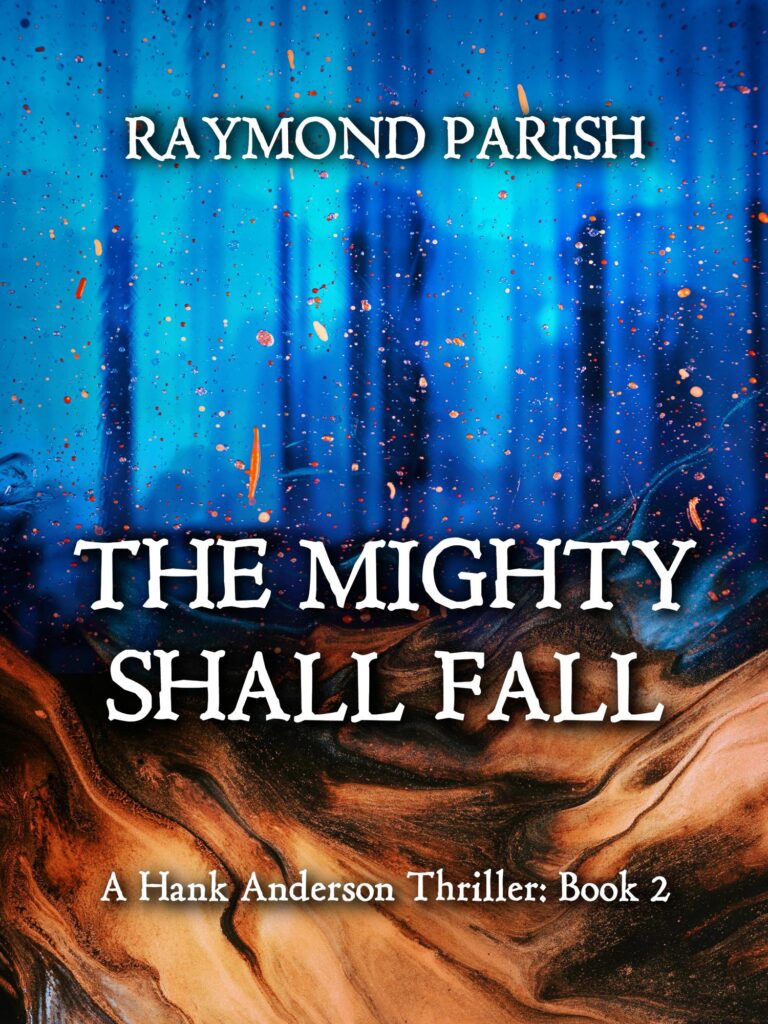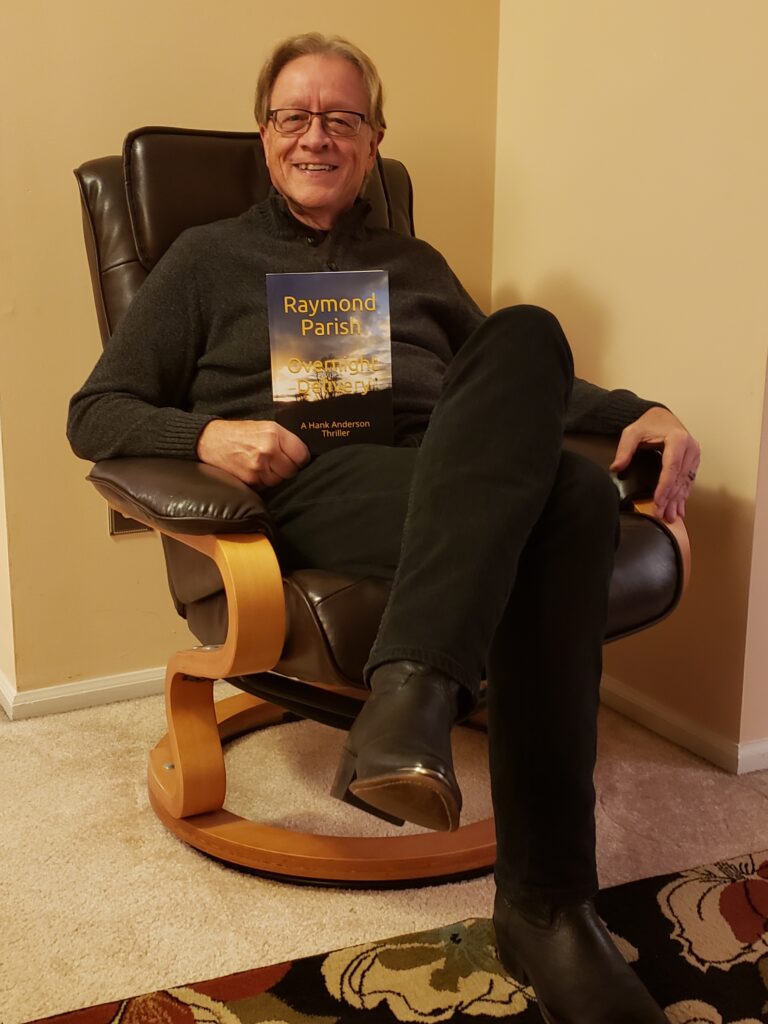

THE BOOKSHELF CAFÉ NEWS AUTHOR INTERVIEW:
RAYMOND PARISH
Does writing energize you or exhaust you? Or both? I experience fiction writing on a continuum between meditation and tension. When I’m in the flow of the characters and narrative of my Hank Anderson Thrillers, the outside world melts away. Immersed in the story, there are periods when I am fully relaxed, suspended in time. There are other times when I’m caught up in the suspense, dilemmas, and danger facing my characters, protagonists and villains. In those moments I connect with the emotion, tension, and humor I’m hoping to present on the page. When I’m able to work from that continuum, each day is its own adventure. Among the folks I run with, the phrase for this result is “a good tired.”
Have you ever considered writing under a pseudonym, and why or why not? As both a fiction and nonfiction writer, I write novels under a pseudonym. As a mental health professional, I’ve always written nonfiction under my real name, Chris Frey. As a way of separating my Hank Anderson Thriller series from my nonfiction work, I created a pen name for Overnight Delivery and The Mighty Shall Fall. Raymond is an homage to one of my writing heroes, Raymond Chandler, and to my dad, who started me off as a reader of mystery/thriller series early in life. Parish is a nod to my mom; it’s a family name. I enjoy continuing to write in both categories, at times reaching different audiences, at times finding where my main character, Hank, intersects with my nonfiction work.
How do you celebrate when you finish your book? When I saw the first copy of Overnight Delivery, Book 1 of the series, I repeated a ritual I developed early in my writing career — Sit, be still, hold the book, appreciate the cover and the text. I didn’t invent this idea. An adaptation of living the moment, it suggests that initially, any creative work needs to be celebrated by those who brought it to fruition free of, ‘what comes next’ — sales, reviews, accolades, disappointments. Next, I celebrate with family, who have supported my writing for years, as first readers, beta readers, unpaid marketing reps, and cheerleaders. Any good news about my publications beyond this point is a bonus.
How much research did you need to do for your book? The Hank Anderson series requires a significant amount of research. The books are set in the Midwest, primarily in Iowa. I’m a former resident of the state and continue to visit, but find it necessary to return to connect with specific neighborhoods, landscapes, the weather, and the feel of both familiar and new locations, in a current and fresh way. One gift provided by my career is the diversity of people I’ve been blessed to know. This is my starting place for additional research on law enforcement, the legal profession, weapons, music, transportation, and other particulars I will not reveal to my reading (I hope) audience. One characteristic I share with my main character, Hank, is a never-ending curiosity about people, which makes research one of the rewards of my writing journey.
If you could be mentored by a famous author, who would it be? I chose this question because it was difficult to answer. So many authors — Raymond Chandler, Dashiell Hammett, O. Henry, Charles Dickens, Laurie King, George Chesbro. I argued with myself until I arrived at Agatha Christie. Hank Anderson has been called, “The male answer to Agatha Christie’s Miss Marple.” I don’t presume to have earned this, but it is a wonderful endorsement. Christie was an early influence as a reader, and so, became an essential influence as a writer. My first question to her would have been, “How did you craft stories both simple and so complex.” Her ability to insert multiple, quirky characters into vivid, contained settings, full of twists and turns, while maintaining the clarity of her story was unparalleled. She managed to accomplish this with suspense and action, but without a focus on graphic violence; something I aspire to.
What do you do to get inside your characters’ heads? I am a psychotherapist by profession. I’ve spent most of my career listening to, and learning about, the lives of diverse, challenged, troubled, and courageous people. Because I am captured by my interest in who people are, not simply who they wish to be, or what they present to the world, I am interested in who my characters truly are. Hank is a man of good intentions and great skill. He is also flawed. As I move from book to book in the series (I’m well into Book 3), I imagine myself listening to Hank and his crew; listening to the villains and their stories. In the best moments, backstories, personalities, strengths, traumas, and eccentricities appear in their thoughts and words. Amid the many trials of plot and characterization, I find this to be one of the most satisfying and natural slices of writing.
What is the most valuable piece of advice you’ve been given about writing? Before I ventured into fiction I attended a writer’s workshop led by a famous, successful author of thrillers. At the end of an interesting, entertaining, and informative seminar he said: ‘I want to thank you for coming to hear me speak today. That being said, if you’ve been telling yourself you don’t have time to write, you could have stayed home today and spent this time writing. Find the time to write.’
What part of the book was the most fun to write? The relationships between characters. In particular, the relationships that continue to develop between the folks in what I call, Hank’s crew. As a psychotherapist, I’m a relationship person. I realized early in the series that I was most interested in a main character whose independent streak collided with his grounding in family and friends; someone whose best and worst choices put him, and those who matter most, deep into the narrative. I wasn’t attracted to developing another lone avenger protagonist. It’s been done. Many times. Better than I ever could. This decision has maximized my investment in the conflict, humor, and progression in the relationships between Hank’s people, and the villains. It is my hope that readers are coming to know Phil, Belinda, Haley, Dennis, Jill, and others, as the characters learn about themselves and one another. This growth is one of the opportunities presented when writing a series.
What risks have you taken with your writing that have paid off? Moving into fiction. After a successful run as a nonfiction writer, I wasn’t certain I could finish a novel, release it to the world, or reach any reader other than myself. First up, a number of skilled people in my life stepped up to help me improve my work. Second, there are people not in my family who read and like my novels. And, I’m enjoying the process. Wow!
Whom do you trust for objective and constructive criticism of your work? My wife. She has been the first reader of everything I’ve written, nonfiction and fiction, since we met. She is both kind and unflinching. We have a ritual — She reads. She has several excellent, macro ideas about improvements to the book. I resist. I think about her input and admit she is absolutely on target. I improve the book and count on others to help me edit the fine points of the story and its structure. I’m writing my seventh book. Probably best to stay the course.